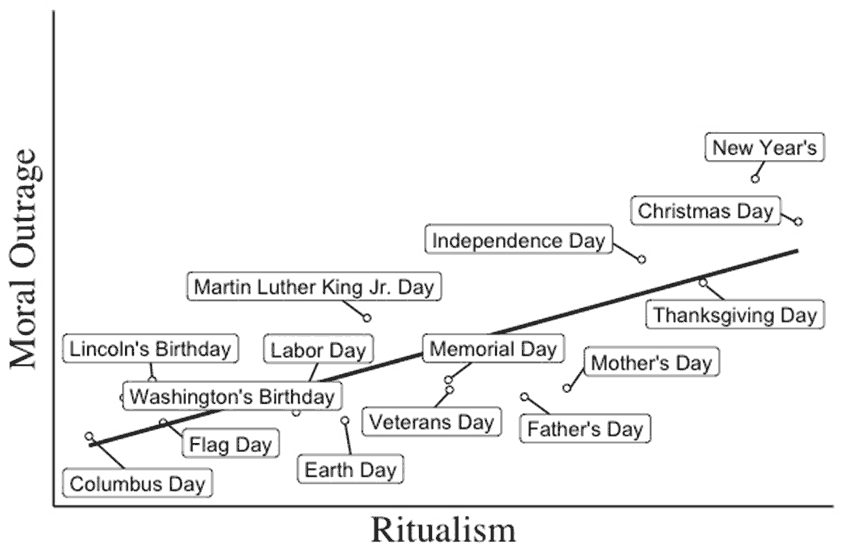On August 20, 2020, the football team Kansas City Chiefs announced the prohibition of Native American-style face paint and ceremonial headdresses at their home stadium.
Although the decision was made with the intention to better respect and celebrate American Indian cultures, especially in the wake of a nationwide push for racial justice following the death of George Floyd, many fans on Twitter responded with outrage over this decision—even threatening to leave the Chiefs’ fan base altogether.
Why did this decision produce such a strong, negative emotional reaction in some fans? Behavioral science research suggests why some people may react negatively to the ban on face paint and headdresses, including political polarization, backlash toward diversity initiatives, and the desire for freedom and control. With my colleagues Juliana Schroeder, Nicholas M. Hobson, Francesca Gino, Michael I. Norton, I looked at yet another explanation.
The Role of Moral Outrage
In our research, we found that alterations to group rituals—such as prohibiting face paint and headdresses at Chiefs games—can provoke moral outrage because altering rituals is perceived as an attack on sacred group values.
Wearing face paint and headdresses at Chiefs games qualifies as a ritual because they are part of a rigid and meaningful sequence that includes the tomahawk chop. The tomahawk chop looks like, as you might guess, someone chopping with a tomahawk—and fans further combine it with chanting the Chiefs’ distinctive cheer and (at least before August 20, 2020) wearing face paint and headdresses. Rituals are actions that are done in a specified way—such as always performing the tomahawk chop when the Chiefs run onto the field—and they have meaning to the individuals who perform them—such as symbolizing the Chiefs’ ability to dominate the opposing team.
We found that the more an action constitutes a ritual—that is, the more the action is done in a rigid and repetitive way and has meaning—the more alterations to the action provoke outrage. To illustrate, one of our studies asked U.S. citizens to consider alterations to 15 different holidays celebrated in the U.S. The holidays naturally varied in ritualism—ranging from low-ritualistic holidays such as Columbus Day to high-ritualistic holidays such as Thanksgiving. We used a survey methodology to assess the degree that each holiday constituted a ritual by our definition and the amount of moral outrage triggered over a hypothetical alteration to the date the holiday is celebrated.
Which Holiday Alterations Triggered the Most Outrage?
Proposed alterations to more ritualistic holidays such as New Year’s, Christmas, and Thanksgiving produced more moral outrage than alterations to less ritualistic holidays such as Columbus Day or Washington’s birthday. The figure below presents these results.

Does the Ritual’s Alteration Have to be Intentional?
Even though rituals represent sacred values that are held to be non-negotiable, we wondered if the nature of the violator’s intention might soften the condemnation.
To find out, we recruited another sample of U.S. citizens to imagine that a fellow citizen recited the U.S. Pledge of Allegiance by sitting down (instead of standing up)—thus, altering the procedure to the ritual. Participants learned different reasons for the alteration:
- Harmful intent—the individual aimed to undermine the country’s value system
- Beneficial intent—the individual aimed to be inclusive to Americans with disabilities who cannot stand
- Accidental intent—the individual forgot to stand
- Lack of ability intent—the individual could not stand due to a medical condition, or
- No information relating to intent
Then we asked whether participants felt any moral outrage—and if so, how much.
For all reasons for sitting except for being physically unable to stand, there was more moral outrage directed at the individual who stayed seated compared to the individual who stood. Thus, even alterations to rituals that are beneficial or undertaken accidentally can invoke outrage in others.
Rituals and Social Change
Overall, our research demonstrates that altering longstanding rituals provokes moral outrage among those who practice them. This has implications for the urgent and necessary efforts to foster diverse and inclusive societies and organizations. There are many rituals and traditions that serve as a roadblock to progress on diversity and inclusion goals, in domains as diverse as collegiate Greek Life to holiday celebrations. Our results suggest that altering these longstanding rituals—even with a stated beneficial intention—can provoke outrage in others, in part because the ritual is viewed as intertwined with the group’s most important values.
For Further Reading
Stein, D. H., Schroeder, J., Hobson, N. M., Gino, F., & Norton, M. I. (2021). When alterations are violations: Moral outrage and punishment in response to (even minor) alterations to rituals. Journal of Personality and Social Psychology. https://doi.org/10.1037/pspi0000352
Stein, D. H., Hobson, N. M., & Schroeder, J. (2021). A sacred commitment: How rituals promote group survival. Current Opinion in Psychology, 40, 114-120. https://doi.org/10.1016/j.copsyc.2020.09.005
Hobson, N. M., Schroeder, J., Risen, J. L., Xygalatas, D., & Inzlicht, M. (2018). The psychology of rituals: An integrative review and process-based framework. Personality and Social Psychology Review, 22(3), 260-284. https://doi.org/10.1177/1088868317734944
Daniel Stein is a doctoral student in the Management of Organizations (MORS) Group at UC Berkeley, Haas School of Business. He conducts research on groups and teams in organizations, focusing on commitment to one's group. He can be reached at [email protected].




